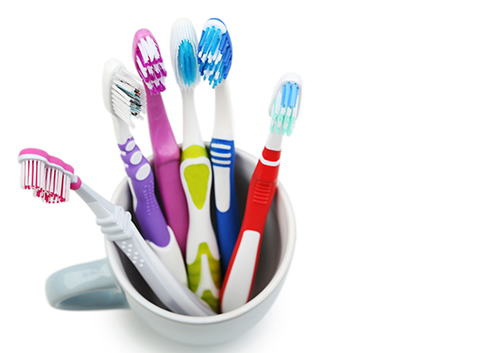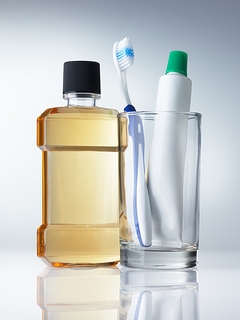Toothbrush Arts and Crafts
December 3rd, 2025

When you replace your old toothbrush every three or four months with a new model, you accomplish three things:
- You keep your teeth cleaner (frayed brushes don’t clean as well)
- You protect your gums (you won’t be scrubbing harder to get your teeth clean)
- You add another toothbrush to your growing collection of used brushes
If creative recycling is one of your talents, you might have already discovered how handy repurposed brushes are for cleaning delicate or hard-to-reach spaces around the house. But those old brushes don’t have to spend their entire existence cleaning! Here are some ideas from Dr. Ford and Dr. Guter to give a new, artistic life to your old, uninspired toothbrush.
- Splatter Painting
As your bathroom mirror can confirm, toothbrushes are great for splattering. Why not put those bristles to creative use by adding color bursts to canvas, wooden picture frames or boxes, fabric, cards, gift wrap and more? Just dip the tips of the bristles into the paint, point them toward your surface, and brush your finger over the head. For more formal effects, splatter paint over your favorite stencils on paper or fabric. Or work your magic by splattering around a stencil for a dramatic silhouette.
- Children’s Painting
Your child might find it great fun to use an old toothbrush to create new works of art. The easy-to-grip handle and wide bristles are perfect for painting those first masterpieces. Splatter painting is also a wonderful art activity for children—but be prepared for some clean-up!
Texturizing Clay Pieces
Whether you work in potter’s clay, polymer clay, or Play-Doh, an old toothbrush can provide any number of interesting textures to your piece. Press the bristles into the clay for a sophisticated stippled background, or brush long gentle strokes for a striated effect.
- Carpentry
Wood glue creates strong bonds when you are joining edges, mitering corners, or fitting mortise and tenon joints. It also creates a sticky mess when you use your fingers, a wood or plastic spreader, or one of your good paint brushes. For any gluing jobs or joinery, try a toothbrush for greater control and easy application.
- Jewelry Making
If you work with jewelry pieces, you know that sometimes there are nooks and crannies that are almost impossible to clean or polish. Try a gentle brush with an old toothbrush and the recommended polish for your piece—but do keep brushes away from the delicate surface of pearls. And for the boldly creative, why not use your toothbrush itself as jewelry? There are online instructions out there for transforming that old brush into a colorful bangle bracelet.
In turns out that there’s a second career waiting for your toothbrush after all! Make sure to clean your toothbrushes thoroughly before using them in another role. After that, let your creativity run wild—including your creative recycling! It’s just another way you are crafting a more beautiful environment for all of us.





 Website Powered by Sesame 24-7™
Website Powered by Sesame 24-7™